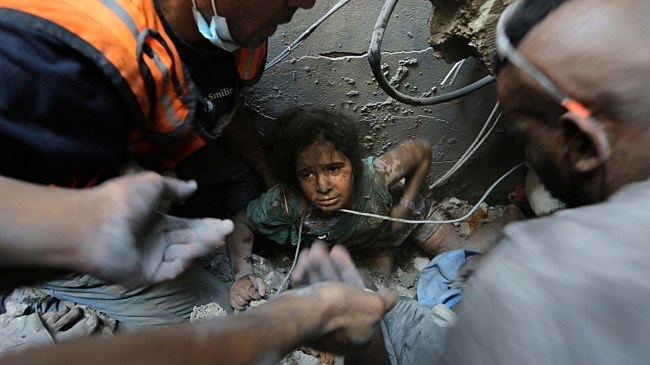Opinion Brutalised children of Gaza: Killing the innocent — and our innocence
They are seen sitting beside dead parents, rummaging in the debris of their homes and completely unprotected from the weapons that will kill them quickly or slowly or disable them for life. The legal systems that should protect their rights have collapsed, the families within which they are nurtured have been killed.
 The images of Palestinian children destroyed by war shock us because we see them unprotected by the systems and structures that are put in place during times of peace to sequester them from violence. (AP)
The images of Palestinian children destroyed by war shock us because we see them unprotected by the systems and structures that are put in place during times of peace to sequester them from violence. (AP) The most disturbing images of the ongoing conflict between Israel and Palestine have been of children — maimed, covered in rubble, bleeding and limbless and in agonising pain, with eyes perpetually frozen in an expression of shock and terror. Sometimes, they are to be seen only as the fragment of a corpse jutting out of the rubble: A leg with the shoe still on, or a hand clutching onto a doll, or a face that has been cemented into blankness by the dust of the rubble. The bodies of children seem so ubiquitous that they cannot be kept out of the frame.
These images shock us into disbelieving the most plausibly constructed justifications for the continuation of the violence. Even repeated and regular exposure to them cannot habituate us into indifference towards the mundane violence of war. And when a society or a nation or a people try to normalise or justify that violence in the name of a political cause or as deserved retaliation, what horrifying dehumanising process has been set into motion?
In our times, childhood has been marked as the phase in which the child has to be nurtured, protected, tended to and socialised into adulthood. The adult world is entrusted with the responsibility of shaping and maintaining a happy, protected, loving space within which the child can be reared and raised, cloistered from the savage cruelties and perversions that the human species is capable of. In the actual process of socialisation, a child can be subjected to the violence and power of the adult world through sanctioned punitive and harsh disciplinary regimes that are accepted as part of the routines of training a child into adulthood. But a war that indiscriminately kills children and maims them ruptures the thin membrane of civilised existence. It provides us with an apocalyptic vision of cruelty and barbarity.
The images of Palestinian children destroyed by war shock us because we see them unprotected by the systems and structures that are put in place during times of peace to sequester them from violence. They are seen sitting beside dead parents, rummaging in the debris of their homes and are completely unprotected from the weapons that will kill them quickly or slowly or disable them for life. The legal systems that should protect their rights have collapsed, and the families within which they are nurtured have been killed. War rips apart the boundaries through and within which a society protects and socialises its children. War shows the fragility of these enclosures and reveals the indifference with which battles fought for political and economic reasons can brush aside the necessity of these protections.
The hurt inflicted on the adult human body, often justified and glorified in the name of martyrdom or patriotism, when meted out to the body of the child shows the horrifying brutality of the violence of war. When the gun that can be turned on the adult without any qualms — in the name of justice or revenge or retaliation — is turned on the child, the terrible gap between the reasons that are given for justifying violence and the terrible excess of that violence becomes shockingly obvious. And then, all justifications for fighting the war crumble down.
The child does not have the power to start or stop a war. We try hard to retain the innocence of childhood by warding off hate and violence from the child. Innocence can be retained by surrounding the child with care and love and gentleness. But war shows the fragility of that enclosed world.
It is through such social architectures that we imagine and practice the sustenance and continuity of a culture, a nation, a world a species. War is a deliberate violence inflicted in order to eliminate a culture, a nation, a race. War sanctions the killing of children and the destruction of all the systems that support their sustenance into adulthood.
The violence of war requires us to abrogate our responsibility to nurture our children through love and tenderness in a world that is peaceful and gentle. War requires us to destroy our capacity for the tenderness which is elicited from us by the young of all the species. War makes us indifferent to the ethical grounding of human society. When we brutally and callously kill and maim children, all that is tender and creative in us is destroyed. Everything in us that sustains our coexistence as a species is cauterised. We create new nations or expand old ones on the graves of our children.
The writer is professor, department of English, Mangalore University






